| - |
Grace Unknown
The Heart of Reformed Theology
R. C. Sproul
Contemporary
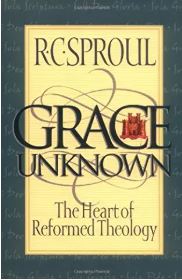
|
|
If you have been looking for a good book to introduce your friends to Reformed
Theology, look no further! In his characteristic easy-to-grasp style, Sproul
discusses the five Solas of the Reformation, and then presents the Five Points
of Calvinism. In each chapter, he addresses the objections commonly raised
against the doctrines presented. Along the way, he explains such issues as
Forensic Justification, Saving Faith, the Covenants, Double Predestination, the
Bondage of the Will, Original Sin and the Order of Salvation. Luther would
heartily approve of his liberal use of Scripture and sound reason. You will
have to search a long time to find a work that lays out all these foundational
doctrines in such a thorough, yet succinct and easy-to-understand manner.
Very highly recommended!
Contents
Introduction Reformed Theology Is a Theology
A Theology, Not a Religion
The Study of Scripture
The Study of History
The Study of Nature
Queen of the Sciences
Theology and Religion at Sinai
Part 1 - Foundations of Reformed Theology
1 Centered on God
Reformed Theology is Catholic
Reformed Theology is Evangelical
God is Incomprehensible
God is Self-Sufficient
God is Holy
2 Based on God's Word Alone
The Inspiration of Scripture
The Infallibility of Scripture
The Inerrancy of Scripture
The Authority of Scripture
The Interpretation of Scripture
3 Committed to Faith Alone
Forensic Justification
Justification by Faith Alone
Saving Faith
Synthetic Justification
The Remission of Sins
One Gospel of Christ
4 Devoted to the Prophet, Priest, and King
The Council of Nicea
The Council of Chalcedon
Reformed versus Lutheran
Christ as Prophet
Christ as Priest
Christ as King
5 Nicknamed Covenant Theology
Preamble
Historical Prologue
Stipulations and Sanctions
Oaths and Vows
Ratification and Deposit
Covenant of Redemption
Covenant of Works
Covenant of Grace
|
Part 2 - Five Points of Reformed Theology
1 Humanity's Radical Corruption
Original Sin
Idolatry
Moral Ability
Free Will
Natural Ability
2 God's Sovereign Choice
Conditional or Unconditional?
The Order of Salvation
Election and God's Righteousness
Election and Moral Inability
Double Predestination?
3 Christ's Purposeful Atonement
God's Will and Redemption
God's Omniscience
The Intercession of Christ
4 The Spirit's Effective Call
Monergistic Regeneration
Resistible Grace
Effectual Calling
Regeneration and Dispensationalism
5 God's Preservation of the Saints
Assurance of Salvation
Assurance and Sanctification
Perseverance in Salvation
Perseverance and Preservation
The Problem of Hebrews
|
|
|
| - |
The God Who Justifies
A Comprehensive Study: The Doctrine of Justification
James R. White
Contemporary
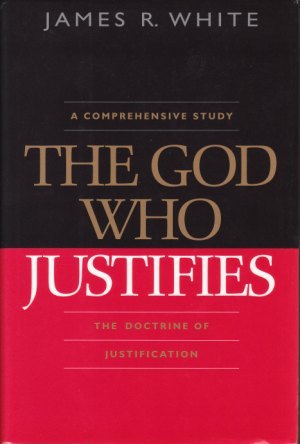
|
|
In this in-depth, yet accessible study of the Biblical doctrine of
justification, Dr. White expounds and defends the very heart of the Gospel.
First, he defines and explains the doctrine of justification. Then he
carefully examines every New Testament occurrence of the words "justify" and
"justification", demonstrating beyond any doubt that the Reformed doctrine of
imputed righteousness is the clear and emphatic teaching of God's Word.
A true classic!
Contents
A Neglected Yet Vital Issue
1. The Heart of the Gospel
2. The Centrality of God's Word
3. Sinners in the Hands of an Angry God
4. What Is Justification by Faith?
5. Justified: The Bible's Meaning
6. The Grounds of Justification: The Cross of Christ
7. Imputation: The Only Hope of the Sinful Soul
8. Luther's Dunghill
9. Introduction to Exegetical Defense and Demonstration of Justification by Faith
10. Romans 1-3:18: The Foundation—Man in Sin
11. Romans 3:19-31: The Gospel Stated
12. Romans 4:1-12: The God Who Justifies
13. Romans 4:13-5:1: Justification Applied
14. Romans 8:28-34: Justification in the Golden Chain of Redemption
15. Accursed of God: The Gospel Brings Judgment
16. Paul Confronts Peter on the Gospel
17. Grace, Faith and Law
18. Fallen From Grace
19. Paul's Summary of Salvation to the Ephesians
20. James Attacks Empty Faith
21. Exegesis of Important Passages Not Yet Covered
Bibliography
Subject Index
Scripture Index
|
|
|
| - |
The Potter's Freedom
James R. White
Contemporary
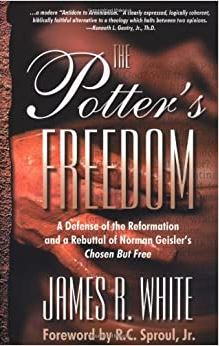
|
|
Dr. White's rebuttal of Norman Geisler's Chosen but Free is a modern-day
equivalent of Martin Luther's classic The Bondage of the Will. The
parallels are too striking to be avoided—Geisler unwittingly plays the
part of Erasmus, appealing to the same flimsy, unscriptural arguments Erasmus
set forth nearly 500 years ago, attempting to dethrone God by setting up human
free-will as the determining factor of our salvation. The Potter's Freedom
appeals to Scripture to answer each objection with great grace and skill, and
provides the Church with a valuable exposition and defense of the doctrines of
God's sovereign grace.
Very highly recommended!
Contents
Preface
Foreward
Introduction
1. The Vital Issue
2. Determinately Knowing
3. The Inabilities of Man
4. The Will of Man
5. Unconditional Election a Necessity
6. CBF's 'Big Three' Verses
7. Jesus Teaches 'Extreme Calvinism'
8. Unconditional Election
9. Responding to CBF on Romans 9
10. The Perfect Work of Calvary
11. Particular Redemption
12. Irresistable Grace is Resurrection Power
13. Irresistable Grace
14. The Potter's Freedom Defended
Scripture Index
|
|
|
| - |
The Reformed Doctrine of Predestination
Loraine Boettner
Contemporary

Click
<here>
to read the book online.
|
|
This book is one of the best introductions to the doctrines commonly called
'Calvinism'. Boettner's descriptions are thorough and precise, yet clear and
easy to understand. He provides plenty of scriptural evidence for the
doctrine, and answers the objections commonly raised against it.
Highly recommended!
Contents
Introduction
SECTION I
Statement of the Doctrine
God Has a Plan
The Sovereignty of God
The Providence of God
The Foreknowledge of God
Outline of Systems
The Scriptures are the Final Authority By Which Systems are to be Judged
A Warning Against Undue Speculation
SECTION II The Five Points of Calvinism
Total Inability
Unconditional Election
Limited Atonement
Efficacious Grace
The Perseverance of the Saints
|
SECTION III Objections Commonly Urged Against the Reformed Doctrine of Predestination
1. That It Is Fatalism
2. That It Is Inconsistent With the Free Agency And Moral Responsibility of Man
3. That It Makes God the Author of Sin
4. That It Discourages All Motives to Exertion
5. That It Represents God As A Respecter of Persons, Or As Unjustly Partial
6. That It Is Unfavorable To Good Morality
7. That It Precludes A Sincere Offer Of The Gospel To The Non-Elect
8. That It Contradicts The Universalistic Scripture Passages
SECTION IV
Salvation By Grace
Personal Assurance That One is Among The Elect
Predestination In The Physical World
A Comparison With The Mohammedan Doctrine of Predestination
SECTION V
The Practical Importance Of The Doctrine
SECTION VI
Calvinism In History
Appendix
Index of Subjects
Index of Authors
Bibliography
|
|
|
| - |
Calvin's Calvinism
John Calvin
1509-1564

Click
<here>
to read the book online.
|
|
As with many great theological works of the Reformation period, this book is a
polemic response to certain errors of its day. In this book, Calvin responds
to theteachings a certain heretic named Albertus Pighius who, as Calvin writes,
attempted 'to establish the free-will of man, and to subvert the secret counsel
of God,' and to another heretic named Georgius. Although modern readers may
feel uncomfortable with Calvin's unflattering descriptions of his adversaries,
this book is priceless in documenting and clarifying Calvin's convictions,
while simultaneously setting forth the sound Scriptural basis for them. Calvin
writes in a very lucid style that is easy to follow, and he captivates your
interest while affirming and explaining some of the most profound doctrines of
the Christian faith. This book should forever stop the mouths of those who
would have us believe that Calvin's Calvinism was more moderate or restrained
than that of the Puritans. At the same time, it demonstrates the giftedness of
this notable Reformer who, arguably, had the greatest influence on the
Protestant world of his day, and for centuries afterward.
|
|
| - |
Jonathan Edwards On Knowing Christ
Jonathan Edwards
1703-1758
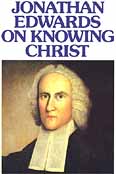
|
|
This is a collection of some of Edwards' sermons, including his best known
"Sinners in the Hands of an Angry God." Edwards' sermons will reach your heart
and conscience, and they always direct us to Christ.
A genuine blessing to read and absorb!
Contents
1. Christian Knowledge
2. God Glorified in Manís Dependence
3. God makes Men sensible of their Misery before He reveals His Mercy and Love
4. Pressing into the Kingdom of God
5. The Justice of God in the Damnation of Sinners
6. Safety, Fulness and Sweet Refreshment to be found in Christ
7. Sinners in the Hands of an angry God
8. Christians a chosen Generation, a royal Priesthood, a holy Nation, a peculiar People
9. The End of the Wicked comtemplated by the Righteous
10. Pardon for the greatest Sinners
|
|
|
| - |
The Cause of God and Truth
John Gill
1697-1771
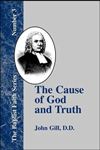
Click
<here>
to read the book online.
|
|
Gill's classic is often out of print, but deserves to be widely read. Gill
addresses nearly every Scripture used by Arminians as a proof text against
Calvinism, and in each case gives a litany of reasons why the passage does not
support the Arminian view.
Valuable as a reference book, but wonderful reading, too!
Contents
Part I
An examination of 60 scripture passages.
Part II - An examination of specific scripture passages concerning...
1 Of Reprobation — A Vindication of.
2 Of Election.
3 Of Redemption.
4 Of Efficacious Grace.
5 Of the Corruption of Human Nature, and the Impotence of the Will of Man to that which is Spiritually Good.
6 Of Perserverance.
Part III - An examination of specific topics...
1 Of Reprobation.
2 Of Election.
3 Of Redemption.
4 Of Efficacious Grace.
5 Of the Freedom of the Will of Man.
6 Of the Perserverance of the Saints.
7 Of the Prescience and Providence of God
8 The state and case of the Heathens
Part IV - An examination of quotations from ancient church writings concerning...
1 Of Predestination.
2 Of Redemption.
3 Of Original Sin, the Impotence of Man's Free Will, &c.
4 Of Efficacious Grace.
5 Of Perserverance.
6 Of the Heathens
|
|
|
| - |
Definite Atonement
Gary D. Long
Contemporary

|
|
This book came from Gary's master's thesis at Dallas Theological Seminary in
the mid 1970's. In it, Gary gives a number of Scriptural and logical proofs for
the doctrine that Christ died for His elect only. He also addresses some of the
passages cited by opponents of the doctrine.
Highly recommended!
Contents
|
Foreward
Preface
1. Introduction
2. Proof for Definite Atonement from the Eternal Purpose and Plan of God
3. Proof for Definite Atonement in the Redemptive Work of Christ
4. Proof for Definite Atonement in the Applicatory Work of the Holy Spirit
5. Conclusion
Appendix
1. Redemption in II Peter 2:1
2. Propitiation in I John 2:2
3. Reconciliation in II Corinthians 5:19
4. An Annotated Doctrinal Sermon Outline on Definite Atonement
5. A Summary of Four Major Problem Verses on the Extent of the Atonement Concerning the Will of God
Annotated Selected Bibliography
|
|
|
| - |
The Bondage of the Will
Martin Luther
1483-1546

Click
<here>
to read the book online.
|
|
I first read Luther's classic while attending the University of Missouri in the
mid-1970's. I was so fascinated that I could hardly put it down. In this book,
Luther shines as a true Calvinist! In it, Luther responds forcefully with sound
Scripture-based logic to the Arminian objections we so commonly hear in our own
day.
A true classic!
|
|
| - |
The Gospel According to Jesus
John MacArthur
Contemporary
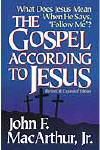
|
|
John demonstrates beyond a doubt that the doctrines of 'easy believism' and
'the carnal Christian' have absolutely no Scriptural basis. God powerfully
saves His saints, and infallibly brings forth good works in their lives.
Repentance is a necessary ingredient in the gospel message and in salvation.
Another 'must read.'
Contents
Foreword by J. I. Packer
Foreword by James Montgomery Boice
Preface to the Revised Edition
Preface to the First Edition
Introduction
Part One: Today's Gospel: Good News or Bad?
1. A Look at the Issues
Part Two: Jesus Heralds His Gospel
2. He Calls for a New Birth
3. He Demands True Worship
4. He Receives Sinners But Refuses the Righteous
5. He Opens Blind Eyes
6. He Challenges an Eager Seeker
7. He Seeks and Saves the Lost
8. He Condemns a Hardened Heart
9. He Offers a Yoke of Rest
Part Three: Jesus Illustrates His Gospel
10. The Soils
11. The Wheat and Tares
12. The Treasure of the Kingdom
13. The First and Last
14. The Lost and Found
15. The Vine and the Branches
|
Part Four: Jesus Explains His Gospel
16. The Call to Repentance
17. The Nature of True Faith
18. The Promise of Justification
19. The Way of Salvation
20. The Certainty of Judgment
21. The Cost of Discipleship
22. The Lordship of Christ
Part Five: Jesus Fulfills His Gospel
23. Tetelestai!: The Triumph is Complete
Part Six: Appendixes
1. The Gospel According to the Apostles
2. The Gospel According to Historic Christianity
3. Answers to Common Questions
Bibliography
Scripture Index
Subject Index
|
|
|
| - |
The Gospel According to the Apostles
John MacArthur
Contemporary

|
|
This book is an in-depth study of the doctrine that true saving faith entails
submitting to Christ as Lord of our hearts and lives. In it, MacArthur deals a
fatal blow to the doctrine of Cheap Grace. This is a book of practical
theology which should be read by everyone who is serious about their salvation.
A Definite 'Must Read' !!
Contents
|
Introduction
1. Prologue
2. A Primer on the 'Lordship Salvation' Controversy
3. Without Faith It Is Impossible to Please Him
4. Cheap Grace?
5. The Necessity of Preaching Repentance
6. Just by Faith
7. Free from Sin, Slaves of Righteousness
8. The Death Struggle with Sin
9. The Faith That Doesn't Work
10. A Foretaste of Glory
11. Kept by the Power of God
12. What Must I Do to Be Saved?
Appendix 1 A Comparison of Three Views
Appendix 2 What is Dispensationalism and What Does It Have to Do with Lordship Salvation?
Appendix 3 Voices from the Past
Glossary
Scripture Index
Subject Index
|
|
|
| - |
The Death of Death in the Death of Christ
John Owen
1616-1683

Click
<here>
to read the book online.
|
|
This book is worth the price just to get Packer's Introductory Essay. However,
the true value of the book lies in the exhaustive treatment given by Owen in
dealing with his subject. In this major work, Owen presents and defends the
Biblical doctrine of Particular Redemption—that is, that Christ died
exclusively for His elect people, and that His death unfailingly saves every
sinner for whom He died. Although Owen's style is justly criticized for being
'heavy and hard to read,' the reader who makes the effort to overcome it will
discover a priceless exposition of the doctrine of redemption.
Contents
Introductory Essay (J. I. Packer)
Analysis of the Book (J. I. Packer)
Epistle Dedicatory
Two Attestations touching the ensuing Treatise
To the Reader
BOOK I
1 —In general of the end of the death of Christ, as it is in the Scripture proposed
2 —Of the nature of an end in general, and some distinctions about it
3 —Of the agent or chief author of the work of our redemption, and of the first thing distinctly ascribed to the person of the Father
4 —Of those things which in the work of redemption are peculiarly ascribed to the person of the Son
5 —The peculiar actions of the Holy Spirit in this business
6 —The means used by the fore-recounted agents in this work
7 —Containing reasons to prove the oblation and intercession of Christ to be one entire means respecting the accomplishment of the same proposed end, and to have the same personal object
8 —Objections against the former proposal answered
BOOK II
1 —Some previous considerations to a more particular inquiry after the proper end and effect of the death of Christ
2 —Containing a removal of some mistakes and false assignations of the end of the death of Christ
3 —More particularly of the immediate end of the death of Christ, with the several ways whereby it is designed
4 —Of the distinction of impretration and application—The use and abuse thereof; with the opinion of the adversaries upon the whole matter in controversy unfolded, and the question on both sides stated
5 —Of application and impetration
|
BOOK III
1 —Arguments against the universality of redemption—The two first; from the nature of the new covenant, and the dispensation thereof
2 —Containing three other arguments
3 —Containing two other arguments from the person Christ sustained in this business
4 —Of sanctification, and of the cause of faith, and the procurement thereof by the death of Christ
5 —Being a continuance of arguments from the nature and description of the thing in hand; and first, of redemption
6 —Of the nature of reconciliation, and the argument taken from thence
7 —A digression, containing the substance of an occasional conference concerning the satisfaction of Christ
8 —Being a second part of the former digression—Arguments to prove the satisfaction of Christ
9 —Of the merit of Christ, with arguments from thence
10 —The last general argument
BOOK IV
1 —Things previously to be considered, to the solution of objections
2 —An entrance to the answer unto particular arguments
3 —An unfolding of the remaining texts of Scripture produced for the confirmation of the first general argument for universal redemption
4 —The last argument from Scripture answered
5 —An answer to the twentieth chapter of the book entitled, 'The Universality of God's Free Grace,' etc., being a collection of all the arguments used by the author throughout the whole book to prove the universality of redemption
6 —The removal of other remaining objections
Some few Testimonies of the Ancients
|
|
|
| - |
Chosen by God
R. C. Sproul
Contemporary
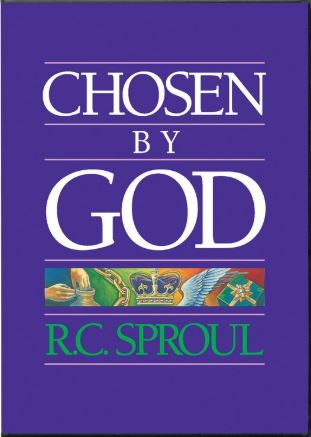
|
|
This is a good introductory work to the doctrine of election. Even so, Sproul
fearlessly tackles the "hot potatoes" of human responsibility and "double
predestination," and gives very lucid, Biblically correct explanations of these
issues. His manner is sensitive and respectful, his style is simple and
straightforward, and his arguments are sound and Scriptural.
Contents
1 The Struggle
2 Predestination and the Sovereignty of God
3 Predestination and Free Will
4 Adam's Fall and Mine
5 Spiritual Death and Spiritual Life: Rebirth and Faith
6 Foreknowledge and Predestination
7 Double, Double, Toil and Trouble: Is Predestination Double?
8 Can We Know That We Are Saved?
9 Questions and Objections Concerning Predestination
|
|
|






